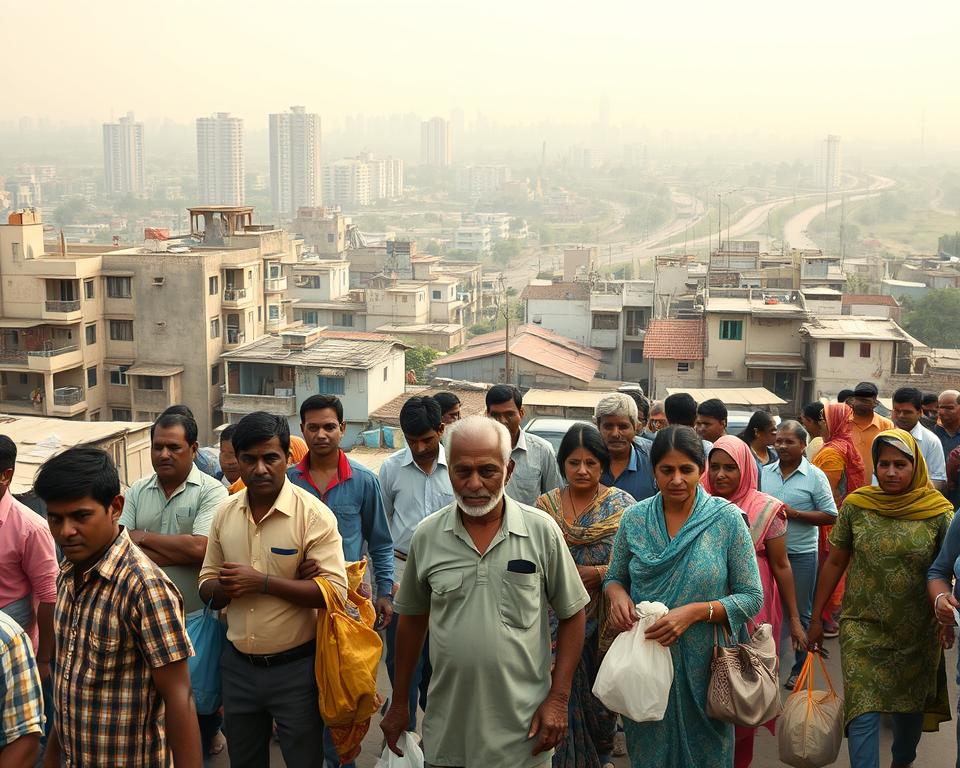The need for domestic workers is growing fast in India. This is because more people need help at home and in offices. Jobs like housekeeping, maids, drivers, and office boys are now very important.
These jobs help homes and offices run smoothly. They offer key services that let families and businesses work well. As the economy gets bigger, the need for good domestic workers keeps going up.
Key Takeaways
- The demand for domestic workers is on the rise in India.
- Roles such as housekeeping, maids, drivers, and office boys are in high demand.
- Domestic workers play a vital role in households and offices.
- The growing economy is driving the need for skilled domestic staff.
- Reliable and efficient domestic workers are essential for family and business operations.
The Domestic Worker Industry in India: An Overview
India’s domestic worker industry is huge and diverse. It plays a key role in many homes. Roles include housekeeping, driving, and office support, helping families of all backgrounds.
Current Market Size and Growth Trends
The industry has grown a lot in recent years. Now, it employs over 4 million people, growing at 8% each year. This growth comes from more people moving to cities, higher incomes, and changing lifestyles.
| Year | Number of Domestic Workers | Growth Rate (%) |
|---|---|---|
| 2015 | 2,500,000 | 5 |
| 2020 | 4,000,000 | 8 |
| 2025 (Projected) | 5,500,000 | 7.5 |
Socioeconomic Impact of Domestic Work in India
The industry deeply affects India’s society and economy. It gives jobs to millions, mainly women and rural migrants. This helps them support their families. It also boosts the economy by helping households run smoothly.
Socioeconomic Benefits:
- Employment for marginalized groups
- Empowers women economically
- Helps urban families with daily tasks

Understanding Different Domestic Worker Jobs in India
Domestic worker jobs in India cover many needs. They include housekeeping, driving, and office help. Each job has its own tasks and needs.
Housekeeping and Cleaning Roles
Housekeeping and cleaning jobs keep homes tidy and clean. Workers do laundry and clean spaces. They also iron clothes and manage waste.
Good housekeeping staff are detailed, hardworking, and can work alone.

Maid Services and Responsibilities
Maid services cover many tasks, like cleaning and cooking. Maids also care for children or the elderly. They are key to a household’s daily life.
Employers want maids who are reliable and skilled in many areas.
Driver Positions and Requirements
Drivers take family members around and do errands. They also keep the vehicle in good shape. Drivers must be safe, on time, and polite.
They might also pick up groceries or drop off dry cleaning. A valid license and clean driving record are needed.
Office Boy/Peon Duties and Expectations
Office boys or peons help in offices. They serve tea, handle mail, and keep supplies ready. They must be careful, respectful, and follow orders well.
They are important for office work to run smoothly. Employers like office boys who are eager and positive.
In summary, domestic worker jobs in India are varied. Knowing what each job involves helps employers and workers work well together.
Essential Qualifications for Domestic Worker Jobs
Knowing what qualifications are needed for domestic worker jobs is key. In India, the needs change based on the job, duties, and what the employer wants.
Educational Requirements by Position
The education needed for domestic workers in India changes with the job. For example, cleaning jobs might not need formal schooling. But, driving jobs need a driving license and some reading skills.
Key educational requirements include:
- Literacy for certain roles
- Driving license for drivers
- Basic education for office boys/peons
Experience Levels Across Different Roles
Experience matters a lot when hiring domestic workers. For example, more experienced maids or housekeepers are often chosen. They need less training. Drivers with lots of experience are also preferred for their route knowledge and safety skills.
Employers typically look for:
- Previous experience in similar roles
- Skills acquired over time, such as cooking or cleaning
- Familiarity with household or office environments
Skill Sets That Employers Value
Employers value many skills in domestic workers. Maids and housekeepers need cleaning and cooking skills. Drivers must know how to navigate and maintain vehicles. Office boys/peons should be good at organizing and talking to people.
Valued skill sets include:
- Cleaning and household management
- Cooking and nutrition
- Childcare and elderly care
- Driving and vehicle maintenance
- Organizational and communication skills
In conclusion, getting a domestic worker job in India requires understanding many things. You need the right education, experience, and skills. Knowing this helps both employers and workers find their way in the job market.
How to Find Domestic Worker Jobs in India
Looking for domestic worker jobs in India can be easier. There are many ways to find the right job. You can use old-fashioned methods or new online tools.
Traditional Job Search Methods
Old ways of finding jobs are good in India, like for domestic workers. Look in local newspapers and on community boards for job ads. Many employers like to post jobs this way.
Word of mouth is also key. Employers often find workers through friends, family, or current staff.
Online Platforms and Placement Agencies
Online tools have changed job hunting in India. Websites and apps help connect employers with workers. They include job boards and services for finding domestic workers.
| Platform Type | Features | Benefits |
|---|---|---|
| Specialised Job Boards | Job listings, resume databases | Wide reach, targeted search |
| Domestic Worker Placement Services | Personalised matching, background checks | Reliable placements, reduced risk |
Networking and Referrals in Indian Communities
Networking in Indian communities is helpful. Social events and gatherings can lead to job chances. You might meet employers or hear about openings.
Referrals from current workers or employers can open doors. A strong network and good reputation are key.
Using old and new methods, and networking, boosts your job search. This way, you can find good domestic worker jobs in India.
Step-by-Step Guide to Applying for Domestic Worker Positions
Getting a domestic worker job in India needs a smart plan. With more people wanting these jobs, it’s getting harder to get noticed. So, it’s key to stand out.
First, know the steps to apply for these jobs. This includes making a good resume, getting ready for interviews, and checking the background verification.
Creating an Effective Resume for Domestic Work
A good resume is very important for domestic worker jobs. It should show your experience, skills, and qualities that fit the job. For example, if you’re applying for cleaning, talk about your cleaning skills and attention to detail.
Key elements to include in your resume:
- Contact information and personal details
- Previous work experience in domestic roles
- Relevant skills, such as cooking or childcare
- Certifications or training related to domestic work
Preparing for Interviews with Indian Employers
Interviews are a big part of getting a domestic worker job. Indian employers want someone skilled, trustworthy, and reliable. To do well, learn what the employer expects and talk about your experience and skills.
A career expert says, “A well-prepared candidate is more likely to make a positive impression on the employer.”
Navigating the Background Verification Process
The background check is a key part of hiring for domestic worker jobs. Employers check if the info you give is true. To pass this step, make sure your resume and documents are correct and honest.
By following these steps and being careful with your application, you can boost your chances of getting a domestic worker job in India.
Salary Expectations and Negotiation Tips
Knowing what you should earn is key for domestic workers in India. Salaries vary a lot based on the job, where you live, and how much experience you have.
Average Pay Scales Across Different Roles
Jobs for domestic workers pay differently. For example, drivers usually earn more than those who clean houses. Here’s a look at average monthly salaries for various jobs in India:
| Role | Average Monthly Salary (INR) |
|---|---|
| Housekeeping Staff | 8,000 – 12,000 |
| Maid | 6,000 – 10,000 |
| Driver | 12,000 – 18,000 |
| Office Boy/Peon | 7,000 – 12,000 |
Regional Variations in Compensation
Salaries for domestic workers change a lot between big cities and small towns. Cities like Delhi and Mumbai pay more than smaller places.
How to Negotiate Fair Wages and Benefits
To get fair pay, you need to know the going rate, know your worth, and speak up. Workers should look up average salaries in their area. They should also talk about their skills and experience during talks.
Being well-informed and confident can help you get better pay and benefits. This makes your job more rewarding and helps your finances too.
Legal Rights and Protections for Domestic Workers in India
The Indian government has made laws to protect domestic workers. These laws are key to ensure fair treatment and safe work conditions.
Understanding Employment Contracts and Agreements
Employment contracts are important for both workers and employers. They outline job details, hours, pay, and leave. Clear contracts prevent misunderstandings and help solve disputes.
For example, a contract might say a worker gets paid leave each year. This makes managing work and laws easier.
Working Hours, Leave Entitlements, and Overtime
Domestic workers must have fair working hours and rest. They also get paid for extra work. Rules on work hours and overtime vary by state, but most are similar.
| State | Standard Working Hours | Overtime Rate |
|---|---|---|
| Delhi | 48 hours/week | Double the regular rate |
| Maharashtra | 50 hours/week | 1.5 times the regular rate |
Grievance Redressal Mechanisms and Legal Support
Domestic workers can use grievance redressal to solve work problems. Legal help is available from NGOs and government agencies.
“The establishment of grievance redressal mechanisms is a significant step towards protecting the rights of domestic workers. It ensures that workers have a formal channel to report abuses and seek redress.”
In conclusion, knowing their legal rights is vital for domestic workers in India. By understanding their rights and support, workers can improve their work conditions and seek fair treatment.
Domestic Worker Jobs in India – Housekeeping, Maids, Drivers, Office Boys: Working Conditions
In India, the work life of domestic workers changes a lot. It depends on if they live with their employer or not. This big difference affects their daily life, job security, and happiness.
Live-in vs. Part-time Arrangements in Indian Households
Live-in workers live with their employer. They work long hours with little personal space. On the other hand, part-time workers have more control. They work set hours and go home to their own place.
The table below shows the main differences between live-in and part-time workers in India.
| Characteristics | Live-in | Part-time |
|---|---|---|
| Residence | Employer’s household | Own home |
| Working Hours | Often long and irregular | Fixed schedule |
| Personal Space | Limited | More control |
Workplace Safety and Health Considerations
Domestic workers in India face many safety and health issues. Physical demands like lifting heavy things and standing for hours can harm their health. Live-in workers might also face more exploitation because of where they live.
Employers can help by making a safe work place. They should respect workers’ rights and make sure they get the healthcare they need.
Employer-Employee Relationship Dynamics in Indian Context
The bond between domestic workers and their employers in India is shaped by culture, society, and economy. Good communication, respect, and clear rules can make a positive work place.
Employers who value and meet their workers’ needs can make a better work environment. This leads to a more harmonious and productive place.
Professional Development and Career Advancement Opportunities
The world of domestic work in India is changing. New chances for learning and growing in careers are opening up. Domestic workers can now find many ways to improve their jobs.
Skill Enhancement and Training Programmes in India
In India, many groups offer training for domestic workers. These courses teach about managing homes, cooking, and caring for children and the elderly. Some NGOs even give certificates that help workers feel more confident and find better jobs.
Moving Up the Career Ladder: Practical Steps
To move up, domestic workers can follow a few steps. These include:
- Looking for more training or certifications to improve skills.
- Meeting other professionals to find out about new jobs.
- Showing employers that you are reliable, trustworthy, and positive.
| Career Advancement Step | Description | Benefit |
|---|---|---|
| Additional Training | Get new skills or certifications | More job chances |
| Networking | Make professional friends | Learn about new jobs |
| Positive Attitude | Show you are reliable and trustworthy | Keep your job safe |
Transitioning to Related Fields and Services
Domestic workers can also move into other areas like caregiving, hospitality, or event planning. They can use their skills to get better jobs in these fields. For example, someone who looks after children could work at a nursery.
By using these chances, domestic workers in India can really improve their careers and grow professionally.
Common Challenges and How to Overcome Them
Working in domestic jobs in India has its ups and downs. You might struggle with what your employer expects and finding time for yourself. These issues can affect how happy you are at work and your overall health.
Dealing with Difficult Employers: Step-by-Step Approach
Handling tough bosses needs a plan. First, talking things through is very important. Workers should make sure they and their bosses are on the same page to avoid problems.
- Writing down what you do helps set clear expectations.
- Talking regularly about how things are going can stop big issues.
- Talking to others in your job or joining groups can give you new ideas.
A worker said, “Talking clearly with my boss about what I do has really helped us get along better.”
“Understanding and being understood is key in any job.”
Managing Work-Life Balance in Domestic Service
Keeping work and personal life separate is key for domestic workers, like those who live with their employers. It helps keep your mind and body healthy.
| Strategy | Benefit |
|---|---|
| Setting clear boundaries | Reduces work stress |
| Having time for yourself | Boosts mental health |
| Doing things you enjoy | Makes you feel better overall |
Addressing Social Stigma and Discrimination
Domestic workers often face prejudice and unfair treatment. We need to tackle this in many ways. This includes spreading the word about the importance of domestic work and fighting for workers’ rights.
Employers and everyone else can help change how people see domestic workers. By seeing the value they bring, we can all help.
Success Stories: Real-life Examples of Career Growth in India
The journey of domestic workers in India is filled with inspiring stories. They have grown their careers and started their own businesses. Their hard work and determination have led to great success.
From Domestic Help to Entrepreneurship: Inspiring Journeys
Many domestic workers have turned their skills into successful businesses. They use their cooking to start catering services. Others manage events like weddings and parties.
These success stories show how domestic workers can grow their careers. They can achieve financial stability by starting their own businesses.
A former maid started a laundry service. It grew into a big business with many employees. These stories inspire others and show career growth is possible.
Long-term Employment and Financial Stability
Getting long-term employment and financial stability is a big achievement. Domestic workers build strong reputations with their employers. This leads to stable jobs and benefits like health insurance.
Some workers save money to buy property or start small businesses. This secures their financial future. Their stories show how hard work and planning can lead to financial stability.
Resources and Support Systems for Domestic Workers in India
Many groups help domestic workers in India. They make sure workers have good conditions and rights. This helps them feel better and work well.
NGOs and Advocacy Groups Working for Domestic Workers
Many NGOs and groups help domestic workers. For example, the National Domestic Workers’ Movement (NDWM) and the Indian Domestic Workers’ Federation (IDWF). They fight for workers’ rights and offer support.
Government Schemes and Initiatives for Worker Welfare
The Indian government has many plans for workers. They offer social security, skills training, and legal help. The Pradhan Mantri Kaushal Vikas Yojana (PMKVY) helps workers get better jobs.
Community Support Networks and Self-Help Groups
Community groups and SHGs help a lot. They give emotional, financial, and social support. Workers can share, get help, and learn new things.
| Resource Type | Description | Benefits |
|---|---|---|
| NGOs and Advocacy Groups | Organisations like NDWM and IDWF | Promote rights, provide support, advocate for better conditions |
| Government Schemes | Initiatives like PMKVY | Social security, skill development, legal protections |
| Community Networks | Self-help groups and community support | Emotional, financial, and social support |
Conclusion
The domestic worker industry in India is big and includes many roles. These are housekeeping, maids, drivers, and office boys. It’s important for employers and employees to understand this well.
Domestic worker jobs in India vary a lot. They have different qualifications, salaries, and work conditions. Knowing the legal rights and support for these workers is key.
In short, to understand domestic worker jobs in India, we need to know a lot. By doing this, we can help make a fair and supportive place for them.


